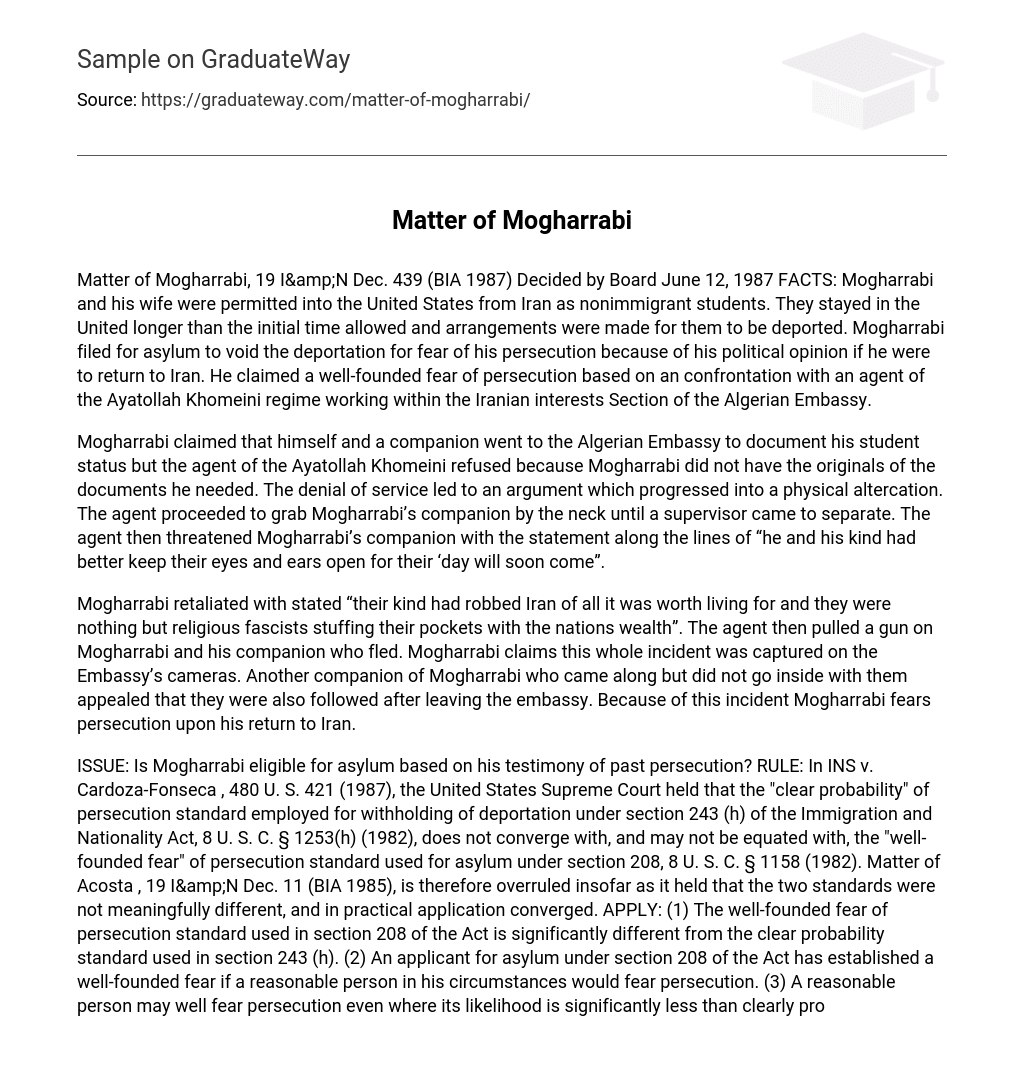Mogharrabi and his wife were permitted into the United States from Iran as nonimmigrant students. They stayed in the United longer than the initial time allowed and arrangements were made for them to be deported. Mogharrabi filed for asylum to void the deportation for fear of his persecution because of his political opinion if he were to return to Iran. He claimed a well-founded fear of persecution based on an confrontation with an agent of the Ayatollah Khomeini regime working within the Iranian interests Section of the Algerian Embassy.
Mogharrabi claimed that himself and a companion went to the Algerian Embassy to document his student status but the agent of the Ayatollah Khomeini refused because Mogharrabi did not have the originals of the documents he needed. The denial of service led to an argument which progressed into a physical altercation. The agent proceeded to grab Mogharrabi’s companion by the neck until a supervisor came to separate. The agent then threatened Mogharrabi’s companion with the statement along the lines of “he and his kind had better keep their eyes and ears open for their ‘day will soon come”.
Mogharrabi retaliated with stated “their kind had robbed Iran of all it was worth living for and they were nothing but religious fascists stuffing their pockets with the nations wealth”. The agent then pulled a gun on Mogharrabi and his companion who fled. Mogharrabi claims this whole incident was captured on the Embassy’s cameras. Another companion of Mogharrabi who came along but did not go inside with them appealed that they were also followed after leaving the embassy. Because of this incident Mogharrabi fears persecution upon his return to Iran.
ISSUE:
Is Mogharrabi eligible for asylum based on his testimony of past persecution?
RULE:
In INS v. Cardoza-Fonseca , 480 U. S. 421 (1987), the United States Supreme Court held that the “clear probability” of persecution standard employed for withholding of deportation under section 243 (h) of the Immigration and Nationality Act, 8 U. S. C. § 1253(h) (1982), does not converge with, and may not be equated with, the “well-founded fear” of persecution standard used for asylum under section 208, 8 U. S. C. § 1158 (1982). Matter of Acosta , 19 I&N Dec. 11 (BIA 1985), is therefore overruled insofar as it held that the two standards were not meaningfully different, and in practical application converged.
APPLY:
- The well-founded fear of persecution standard used in section 208 of the Act is significantly different from the clear probability standard used in section 243 (h).
- An applicant for asylum under section 208 of the Act has established a well-founded fear if a reasonable person in his circumstances would fear persecution.
- A reasonable person may well fear persecution even where its likelihood is significantly less than clearly probable.
- An alien’s own testimony in an asylum case may be sufficient, without corroborative evidence, to prove a well-founded fear of persecution where that testimony is believable, consistent, and sufficiently detailed to provide a plausible and coherent account of the basis for his fear.
- Matter of Acosta’s requirement that an applicant for asylum
CONCLUSION:
Yes. Mogharrabi testimony is is credible, persuasive, and specific enough to be objective evidence that proves either past persecution or ‘good reason’ to fear future persecution.





